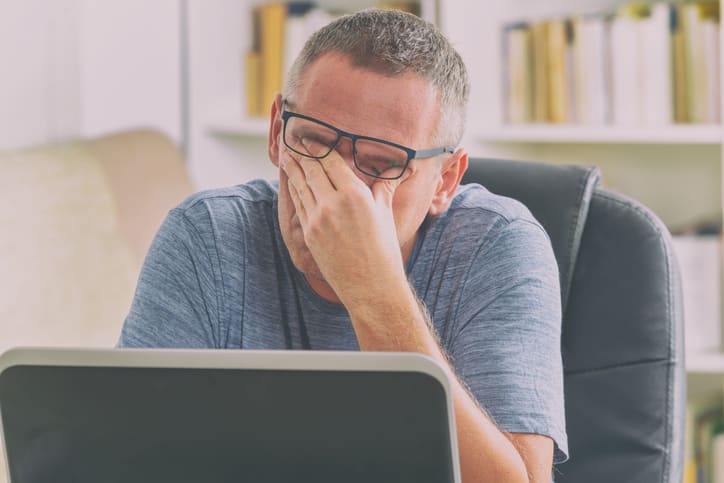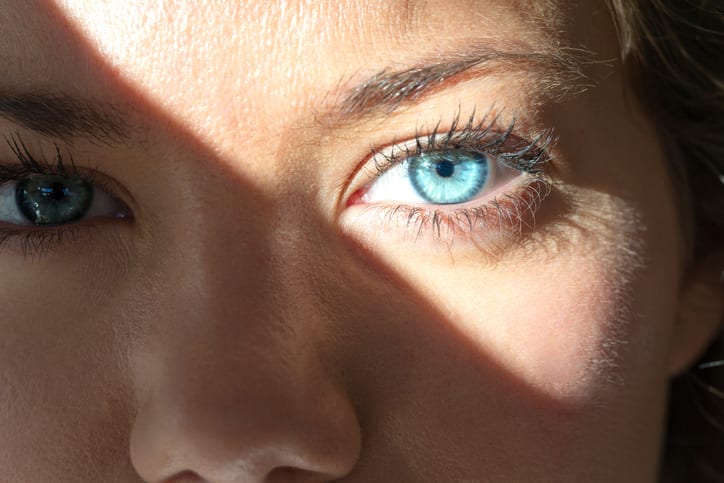-
How to Maintain Healthy Eyes as You Age

The older you get, the more your doctor emphasizes the importance of eating well and exercising to stay healthy. Good nutrition and physical activity certainly benefit your body, but making specific lifestyle changes can also help delay or prevent age-related eye diseases. Follow these tips to maintain healthy eyes as you age.
Schedule Regular Eye Exams
Annual visits to the eye doctor are recommended for everyone, but once you hit 40, regular eye exams become even more crucial. Yearly visits can help catch glaucoma, macular degeneration and other eye diseases in their early stages, making them easier to treat. Your eye doctor can also detect other non-sight related illnesses during a comprehensive eye exam, including hypertension, diabetes, STDs and some forms of cancer.
Visit the Eye Doctor if You Injure Your Eyes
It isn’t enough to rinse your injured eye under cool water and hope it gets better. If you experience vision problems or eye discomfort at any time, call your eye doctor right away. Receiving professional medical attention is the best way to safeguard your vision.
Protect Your Eyes from Bright Light
Chronic exposure to UV rays and sources of high-energy “blue light” can damage the macula, cornea and lens. To shield your eyes, try these suggestions:
- Wear dark-tinted sunglasses while outside.
- Turn on your computer’s “night light” feature to decrease the amount of blue light the screen emits.
- Wear blue-blocking computer glasses with yellow-tinted lenses.
- Illuminate your home with CFLs and LEDs that emit “warm” light.
Adopt a Healthy Diet
The food you eat doesn’t just affect your waistline – it also contributes to healthy eyes. If you eat a diet high in saturated fat and sugar, you increase your risk of eye disease. On the other hand, eating natural, healthy food can help prevent vision problems. Here’s what to include in your diet to improve eye health as you age:
- Dark green and brightly colored fruits and vegetables for vitamin A, vitamin C, lutein and zeaxanthin
- Fish, nuts and plant-based oil for omega-3 essential fatty acids
- Lean meat, legumes, fish and eggs for protein
- Whole grains to avoid the sugars in refined white flour
- Water and other sugar-free, caffeine-free drinks to stay hydrated
Quit Smoking
Smoking increases the amount of oxidative stress in your body, which can increase your chances of developing age-related macular degeneration (AMD), cataracts and glaucoma. Give up smoking, and you’ll improve nearly every aspect of your health, including your vision.
Get Enough Sleep
Maintaining a healthy sleeping pattern improves your overall well-being. It’s also a chance to rest your eyes and help them rejuvenate for the following day. Aim for at least seven hours of sleep each night. Avoid looking at your Smartphone right before bed, as the blue light of the LED screen can keep you awake.
For more tips to maintain healthy eyes as you age, or to schedule an eye exam in Chicago, IL, please contact Gerstein Eye Institute at 773.596.9545.
-
How Does Bright Light Affect Your Vision?

The iris serves as your eye’s main defense against bright light. This is the colored part of your eye responsible for reducing and enlarging the size of your pupil. When intense light rays reach your eye, the iris responds by constricting the pupil, thus protecting the retina and helping it process the incoming image better. The opposite occurs in low light when the iris dilates the pupil to allow as much light in as possible.
Can Bright Light Damage Your Vision?
In short, yes, staring at bright lights can damage your eyes. When the retina’s light-sensing cells become over-stimulated from looking at a bright light, they release massive amounts of signaling chemicals, injuring the back of the eye as a result.
The sun shines with such intensity that staring directly at it for just a few seconds can cause permanent retinal damage. Chronic exposure to UV rays over many weeks, months or years can also harm the macula, cornea and lens. A damaged macula leads to macular degeneration. A “sunburned” cornea can cause blurry vision and loss of eyesight. A damaged lens may develop a cataract, or clouding of the lens that blurs vision.
Blue light, even at moderate intensity levels, can damage your retinas slowly over time. Blue light has shorter wavelengths than warmer light, so it has more energy. Prolonged exposure may increase the risk of age-related macular degeneration (AMD). Sunlight is the most prominent source of blue light, but other examples include fluorescent lights, LEDs, TVs, computer monitors and Smartphone screens.
How to Treat and Prevent Eye Problems from Bright Light
Protect your vision with these tips:
- Choose glasses with anti-reflective lenses to reduce glare from bright lights.
- Wear dark-tinted sunglasses and a brimmed hat while outside. Polarized sunglasses with UV protection further shield your eyes from the effects of blue light and ultraviolet rays.
- Decrease daily screen time and take frequent breaks to rest your eyes.
- Turn on your computer’s “night light” feature to decrease the amount of blue light the screen emits.
- Wear blue-blocking computer glasses with yellow-tinted lenses that ease digital eyestrain.
- Choose CFLs and LEDs that emit “warm” light.
- If you require cataract surgery, seek blue-blocking intraocular lens (IOL) implants to protect your retinas the same way sunglasses do.
If you’re experiencing any vision problems or discomfort after exposure to bright light, visit Gerstein Eye Institute in Chicago, IL for an evaluation. Our commitment to helping patients protect their vision dates back to 1968. For more information, or to schedule an eye appointment, please contact us at 773.596.9545 today.
